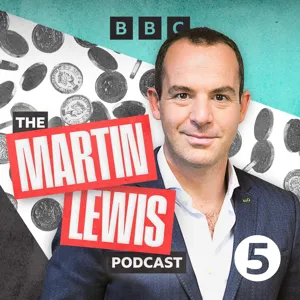Podcast Summary
The Importance of Flexibility in Life: Health Insurance, Hiring, and Finances: Stay flexible in life by exploring budget-friendly health insurance options, finding hidden job candidates on LinkedIn, and understanding tax implications on savings and investments.
Flexibility is key in various aspects of life, whether it's through practicing yoga, choosing the right health insurance plan, or hiring for a small business. During this podcast episode, listeners were reminded of the importance of flexibility and were introduced to various resources and tips to help achieve it. For those seeking flexibility in their health insurance, UnitedHealthcare Insurance Plans, underwritten by Golden Rule Insurance Company, were highlighted as an option for budget-friendly medical, dental, and vision coverage. Flexibility was also emphasized in the hiring process, with LinkedIn being recommended as the go-to platform for finding professionals who might not be actively looking for a new job but could still be a great fit for your business. The podcast also featured a segment called Martin's Mastermind, where financial knowledge was tested in a lighthearted and humorous way. During this segment, listeners learned about the importance of understanding tax implications on savings and investments, as well as the personal savings allowance that can help reduce tax liabilities. Throughout the episode, the importance of being adaptable and open to new opportunities was emphasized, whether it's through personal growth, financial planning, or business expansion. By staying flexible and being open to new ideas, listeners were encouraged to make the most of every situation and achieve their goals.
Nehal's Chicken Suit and Credit Card Misconceptions: Nehal got a job wearing a chicken suit, not due to fanbase. Credit card 0% offers have no set percentage of applicants, and energy bills have standing charges.
Nehal was selected for a chicken-related role not because of his fanbase, but because he was the only one willing to wear a chicken suit. Regarding the credit card question, there is no rule stating what percentage of applicants must receive the full 34-month 0% balance transfer offer. The representative APR concept applies to a specific percentage of accepted applicants receiving the representative rate for loans, but not for credit cards with "up to" 0% offers. Nehal's goal is to reduce his energy bill to zero, but he needs to consider the standing charges for accessing energy. His options for the annual energy bill are £73, £173, or an indeterminate amount.
Consumer confusion over energy bill payment options and high standing charges: Consumers face a choice between convenience and cost-effectiveness when it comes to energy bill payments, with high standing charges disproportionately affecting those who use less energy.
During a discussion about energy bills, it was revealed that a consumer had the option to pay £73, £173, or £273 per year for gas and electricity through a direct debit, with the highest option being the most convenient but not necessarily the most cost-effective. Nehal, the speaker, expressed his confusion about the exact figures and jokingly considered getting them tattooed to remember. The standing charges for electricity and gas are currently £0.463 and £0.285 per day, respectively, totaling approximately £1.75 per day and £273 per year. Nehal expressed his concern about the high standing charges, especially for those who use less energy, and his belief that the moral hazard of paying a large amount annually even without using much energy is not ideal. Despite his lobbying efforts, the issue was not addressed in this instance. Nehal also shared his recent win at the Asian Media Awards as Media Personality of the Year 2022 and his plans to build a miniature trophy cabinet, which brought some levity to the conversation.
Borrowing More for a Lower Rate: When close to a loan threshold, borrowing a larger amount could lead to lower monthly repayments due to a lower interest rate. Use extra cash for overpayments to save long-term.
Although it might seem counterintuitive, borrowing a slightly larger amount for a loan could result in lower monthly repayments due to a lower interest rate for that larger loan amount. However, this strategy only applies when borrowing is close to a threshold where the interest rate drops. For instance, if someone named "Niall" needs a loan to buy expensive miniatures and is deciding between borrowing £4,650 at an 8.3% interest rate or £5,000 at a 5.1% interest rate, the cheaper option would be to borrow £5,000 and make the same monthly repayments, resulting in having £3,500 extra in hand. This extra cash could then be used to overpay the loan, potentially saving money in the long run. However, it's essential to remember that representative APR in the UK means that only a certain percentage of accepted applicants will receive the money at the advertised rate, making it necessary to check eligibility and loan rates beforehand. Additionally, it's generally recommended to minimize borrowing and get the cheapest loan possible.
Borrowing extra to save on interest: Overpaying a loan by a small amount can lead to lower overall interest payments, but there might be minor penalties. Be cautious with bank deposits, as not all are fully protected by government guarantees.
Borrowing a slightly larger amount than needed and immediately repaying the excess can lead to lower overall interest payments in certain loan scenarios. However, there can be minor interest penalties for doing so. This quirk in the loan market can result in paying less in total, not just less interest. For instance, if one borrows £4,805,000 instead of £4,750,000, they would repay less per month and less in total, despite initially overpaying. On a different note, it's crucial to be aware that not all bank deposits are fully protected by government guarantees. For example, if a friend had deposited £500,000 from a home sale into Arthur Naiake Bank two months ago, they would not have been protected by the Financial Services Compensation Scheme, as the bank went bust. This highlights the importance of understanding the specifics of financial institutions and their regulations.
Financial Protection for Savings: Up to £85,000 per person per institution, with temporary protection up to £1,000,000 after a life event.: Under the financial services compensation scheme, individuals are protected up to £85,000 for savings per person per financial institution. Temporary protection up to £1,000,000 applies after a life event. Be aware of what constitutes a financial institution and potential limitations of coverage.
Under the financial services compensation scheme, individuals are protected up to £85,000 per person per financial institution for savings. However, in specific circumstances such as after a life event, temporary balances up to £1,000,000 are protected for six months. It's essential to understand what counts as a financial institution, and having more than £85,000 in one institution may not provide full protection. The discussion also touched upon linking credit files when applying for credit, with only one party able to do so if they have a joint credit card, joint bank account, or start cohabiting.
Joint Financial Products and Credit History: Be cautious with joint financial products as they can negatively impact your credit history
If you are in a relationship or living situation with someone who has a poor credit history, be cautious about applying for joint financial products such as bank accounts, loans, or mortgages. These joint products can link your credit files, potentially limiting your ability to obtain credit based on the other person's credit history. Joint credit cards do not exist in the UK; instead, a person can be added as a secondary cardholder on someone else's account. Other factors like marriage, cohabiting, or being flatmates do not link your credit files. It's essential to understand the implications of joint financial products to protect your credit standing.
Airline cancellation rights in EU/UK: When flights are cancelled, passengers are entitled to a refund or next available flight. Compensation is only due if less than 2 weeks notice was given and delay is over 2 hours.
If an airline cancels your flight, you have the right to either a refund or to be put on the next available flight. However, if you are entitled to compensation, the airline must have notified you less than 2 weeks before the flight, and the cancellation must have caused a delay of 2 hours or more. Even if you choose a refund instead of an alternative flight, the time of that flight can still impact the compensation amount. It's important to note that this applies to EU or UK-regulated flights, and the airline is responsible for staff shortages and other issues causing cancellations, including those related to COVID-19.
Understanding Minimum Repayments vs Compensation for Flight Cancellations: Minimum repayments on credit card debt can prolong the repayment period, while flight cancellations due to airline faults offer fixed compensation.
When flights are canceled due to the airline's fault, such as staff shortages, passengers are entitled to a fixed amount of compensation. However, when it comes to credit card debt, paying only the minimum repayment can lead to a long repayment period. For instance, with a £1,000 debt and a 21.9% APR, it would take approximately 3.5 years to repay if only the minimum repayment is made each month. But if no more borrowing is done, the debt could be paid off in 11 years, or it might never be paid off depending on the credit card terms. It's essential to understand the implications of minimum repayments and the importance of being aware of compensation rights when dealing with flight cancellations.
Paying more than minimum repayment saves time and money: Paying more than minimum repayment in the first month can significantly reduce the repayment period and save on interest costs.
Making the minimum repayment on a credit card debt may seem like a good idea, but it could end up costing you more in the long run due to high interest rates. However, if you can afford to pay more than the minimum repayment in the first month, you can significantly reduce the repayment period and save on interest costs. This strategy, known as "locking in" your repayment amount, can help you pay off your debt much faster. For instance, if you owe £10,000 on a credit card with an interest rate of 18%, the minimum repayment would be around £260 per month, and it would take you 19 years to pay off the debt with a total interest cost of £14,600. But if you pay £260 every month from the first month, you could pay off the debt in just 5 years and 2 months, with an interest cost of only £609. So, it's worth considering whether you can afford to pay more than the minimum repayment to save time and money in the long run.





